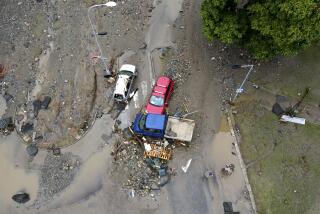Not Everyone Agrees Floods Provide an Economic Boost
- Share via
OSTRAVA, Czech Republic — As monthlong flooding eases in Central Europe, some economists are raising a new storm with claims that the ruinous rain clouds may have a silver lining.
Although the personal suffering and loss of life are beyond measure, these experts say a natural disaster is not always bad for a transforming economy’s bottom line, particularly when it strikes in the right place.
“In the short term, the flood sets everything back a bit because of the enormous time and energy needed for basic cleanup,” said Stephen Heintz of the Institute for East-West Studies in Prague, the Czech capital. “But if the process is handled strategically, over the longer term we can see some positive elements that will be good for economic development.”
Polish Finance Minister Marek Belka offered a similar observation in Warsaw, predicting that the flood recovery may speed up economic growth because of an expected building boom. Other economists suggest that the unemployment rate will plunge as jobless Poles find work in reconstruction.
But not everyone is smiling at the sunny scenario.
Dariusz Grabowski, an economist with the opposition Solidarity Electoral Action, characterized talk of a flood-induced revival as both indecent and economically flawed.
Hanna Gronkiewicz-Waltz, president of the Polish National Bank, said she was flabbergasted by the speculation. “I cannot really imagine wars or disasters being something good,” she told reporters. “Of course, the economy grows after them because life is getting back to normal, but we really don’t need such incentives, which decrease our national wealth.”
In the Czech Republic, no one disputes that the July deluge came at an awful time for the ailing economy. The government of Prime Minister Vaclav Klaus has already introduced two austerity packages this year, and more budget cuts are now needed. According to preliminary estimates, the flood waters have caused $1.5 billion to $3 billion in damage in the Czech Republic alone--or as much as more than 3% of the Czech gross domestic product.
“It is really an unfortunate sequence of events,” said Vladimir Kreidl, an economist at the Czech investment bank Patria Finance.
Yet in places such as Ostrava, a bleak industrial center in the country’s heavily flooded Moravian region, Kreidl and others insist that the floods may do some good.
Long before the rains began falling here, the economic landscape was undergoing a difficult make-over. The last of Ostrava’s inefficient coal mines had been shut. The city’s biggest steel mill slashed 26,000 workers from its bloated, Communist-era payroll.
“Now, the floods could provide a modernization impulse by directing state resources to the area,” Kreidl said. “Instead of seeing more and more holes in the roads, Ostrava will get entirely new roads.”
And fewer railways--also making good economic sense, the analysts say. The money-losing Czech railroad network is heavily subsidized, but the government has refused to cut politically sensitive routes. The Transportation Ministry now says hundreds of miles of submerged track in Moravia will not be repaired.
“Without the floods, they would never have had the courage to do this,” Kreidl said.
More to Read
Sign up for Essential California
The most important California stories and recommendations in your inbox every morning.
You may occasionally receive promotional content from the Los Angeles Times.









